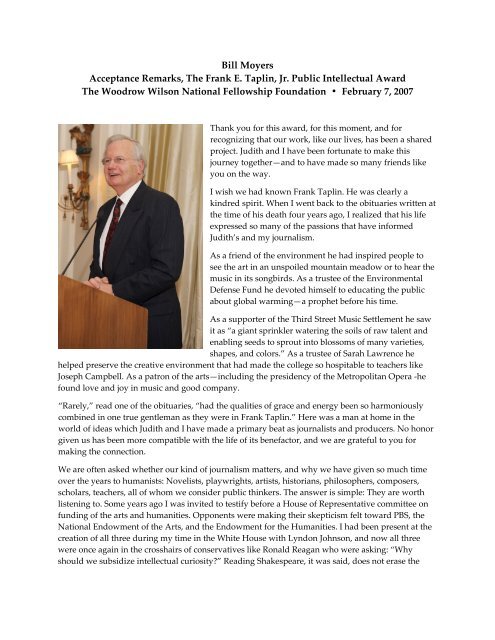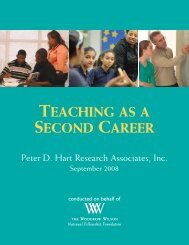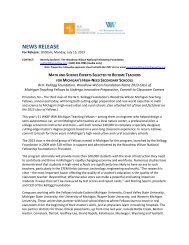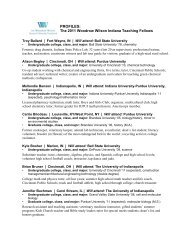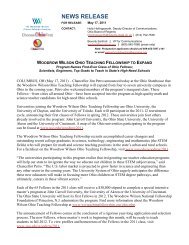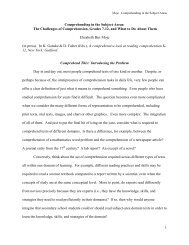Bill Moyers - Woodrow Wilson National Fellowship Foundation
Bill Moyers - Woodrow Wilson National Fellowship Foundation
Bill Moyers - Woodrow Wilson National Fellowship Foundation
You also want an ePaper? Increase the reach of your titles
YUMPU automatically turns print PDFs into web optimized ePapers that Google loves.
<strong>Bill</strong> <strong>Moyers</strong><br />
Acceptance Remarks, The Frank E. Taplin, Jr. Public Intellectual Award<br />
The <strong>Woodrow</strong> <strong>Wilson</strong> <strong>National</strong> <strong>Fellowship</strong> <strong>Foundation</strong> • February 7, 2007<br />
Thank you for this award, for this moment, and for<br />
recognizing that our work, like our lives, has been a shared<br />
project. Judith and I have been fortunate to make this<br />
journey together—and to have made so many friends like<br />
you on the way.<br />
I wish we had known Frank Taplin. He was clearly a<br />
kindred spirit. When I went back to the obituaries written at<br />
the time of his death four years ago, I realized that his life<br />
expressed so many of the passions that have informed<br />
Judith’s and my journalism.<br />
As a friend of the environment he had inspired people to<br />
see the art in an unspoiled mountain meadow or to hear the<br />
music in its songbirds. As a trustee of the Environmental<br />
Defense Fund he devoted himself to educating the public<br />
about global warming—a prophet before his time.<br />
As a supporter of the Third Street Music Settlement he saw<br />
it as “a giant sprinkler watering the soils of raw talent and<br />
enabling seeds to sprout into blossoms of many varieties,<br />
shapes, and colors.” As a trustee of Sarah Lawrence he<br />
helped preserve the creative environment that had made the college so hospitable to teachers like<br />
Joseph Campbell. As a patron of the arts—including the presidency of the Metropolitan Opera ‐he<br />
found love and joy in music and good company.<br />
“Rarely,” read one of the obituaries, “had the qualities of grace and energy been so harmoniously<br />
combined in one true gentleman as they were in Frank Taplin.” Here was a man at home in the<br />
world of ideas which Judith and I have made a primary beat as journalists and producers. No honor<br />
given us has been more compatible with the life of its benefactor, and we are grateful to you for<br />
making the connection.<br />
We are often asked whether our kind of journalism matters, and why we have given so much time<br />
over the years to humanists: Novelists, playwrights, artists, historians, philosophers, composers,<br />
scholars, teachers, all of whom we consider public thinkers. The answer is simple: They are worth<br />
listening to. Some years ago I was invited to testify before a House of Representative committee on<br />
funding of the arts and humanities. Opponents were making their skepticism felt toward PBS, the<br />
<strong>National</strong> Endowment of the Arts, and the Endowment for the Humanities. I had been present at the<br />
creation of all three during my time in the White House with Lyndon Johnson, and now all three<br />
were once again in the crosshairs of conservatives like Ronald Reagan who were asking: “Why<br />
should we subsidize intellectual curiosity?” Reading Shakespeare, it was said, does not erase the
<strong>Bill</strong> <strong>Moyers</strong> • Remarks, Frank Taplin Award Acceptance<br />
The <strong>Woodrow</strong> <strong>Wilson</strong> <strong>National</strong> <strong>Fellowship</strong> <strong>Foundation</strong> • February 7, 2007<br />
Page 2<br />
budget deficit. Plunging into the history of the l5 th century does not ease traffic jams. Listening to<br />
Mozart or reading the ancient Greeks does not repair the ozone layer.<br />
We had recently produced two series on poetry called “The Language of Life” and “The Power of<br />
the Word.” Our series on “Joseph Campbell and the Power of Myth” was resonating far and wide,<br />
much to the displeasure of sectarian dogmatists. We had created a documentary special called “The<br />
Power of the Past,” about how Florence valued art for public, and not merely private, consumption.<br />
Our series on “A World of Ideas” offered conversations from a wide spectrum of voices: Chinua<br />
Achebe, Carlos Fuentes, Northrop Frye, Joseph Heller, Thomas Wolfe, Richard Rodriguez, Bharati<br />
Mukherjee, Jonas Salk, William L. Shirer, Tu Wei‐ming, Toni Morrison, Joanne Ciulla, Ernesto<br />
Cortes, M.F.K. Fisher, Mary Ann Glendon, Leon Kass—and so many others who opened our viewers<br />
to what my old friend and colleague Eric Sevareid once called “news of the mind.”<br />
We had taken note of a lament in The Atlantic Monthly by David Denby that “Americans have ceased<br />
talking to one another. Instead, they entertain one another, and do so in all sorts of places where<br />
entertainment is beside the point or corrupting. Under the tyranny of affability and simplicity, public<br />
discourse—in politics, religion, and education—has collapsed into smiling drivel.” We had also taken<br />
note of a warning by the educator Herbert Kohl that “If we do not provide time for the consideration<br />
of people and events in depth, we may end up training another generation of television adults who<br />
know what kind of toilet paper to buy, who know how to argue and humiliate others, but who are<br />
thoroughly incapable of discussing, much less dealing with, the major social and economic problems<br />
that are tearing America apart.”<br />
That was 20 years ago—before cable, Limbaugh, FOX News, and bloggers.<br />
Critics pointed out that these programs taught no one how to bake bread or build bridges. And they<br />
were right: Despite public television—not to mention symphony orchestras, municipal libraries, art<br />
museums, and public theatres—crime was still rampant, the divorce rate was soaring, corruption<br />
flourished in politics, legislatures remained stubbornly profligate, corporations cooked their books,<br />
liberals were loose in the world doing the work of the devil, and you still couldn’t get a good meal<br />
on the Metro to Washington. Why persist, some members of Congress wanted to know, when there<br />
are so many more urgent needs to be met, so many more practical problems to be solved?<br />
Not that we hadn’t wrestled with these questions ourselves. Judith knows of the angst I often experience<br />
in choosing between producing a series on faith and reason, as we did last summer, and taking on an<br />
investigative documentary on mountaintop mining, or skullduggery in the boardroom, or the<br />
manipulation of intelligence to justify a war. Life is short and funding scarce, and how to commit one’s<br />
time and resources is a dilemma not alone for journalists and producers but for any one struggling to<br />
make the best choice when two roads diverge in the yellow wood. (We usually take both.)<br />
So down I went down to Washington without a tried and true answer for the Representatives. I could<br />
not hand them a ledger showing that ideas have consequences. I chose instead to tell them what they<br />
could have learned if they had been listening to the people who appeared in our broadcasts.<br />
They would have heard the novelist Maxine Hong Kingston say: “All human beings have this burden in<br />
life to constantly figure out what’s true, what’s authentic, what’s meaningful, what’s dross, what’s a<br />
hallucination, what’s a figment, what’s madness. We all need to figure out what is valuable, constantly.<br />
As a writer, all I am doing is posing the question in a way that people can see very clearly.”
<strong>Bill</strong> <strong>Moyers</strong> • Remarks, Frank Taplin Award Acceptance<br />
The <strong>Woodrow</strong> <strong>Wilson</strong> <strong>National</strong> <strong>Fellowship</strong> <strong>Foundation</strong> • February 7, 2007<br />
Page 3<br />
They would have heard Peter Sellars, the iconoclastic director of Shakespeare in a swimming pool and<br />
Mozart in the Bronx, explain that he wants “to put our society up next to these great masterpieces. Are<br />
we thinking big enough? Are we generous of spirit? What does our society look like, next to the greatest<br />
things a human being ever uttered?”<br />
They would have heard Vartan Gregorian, then head of the New York Public Library, talk about how<br />
“in a big library, suddenly you feel humble. The whole of humanity is in front of you. It gives you a<br />
sense of cosmic relation, but at the same time a sense of isolation. You feel both pride and insignificance.<br />
Here it is the human endeavor, human aspiration, human agony, human ecstasy, human bravura, and<br />
human failures—all before you. And you look around and say, ‘Oh, my God! I am not going to be able<br />
to know it all.’”<br />
They would have heard the philosopher Martha Nussbaum confess that in one sense there is no message<br />
or moral in the ancient Greek dramatists—“simply the revelation of life as seen through the sufferer.”<br />
But there is a value; she went on, “in seeing the complexity in life, and seeing it honestly, without<br />
flinching, and without reducing it to some excessively simple theory.” You begin then, she said, to<br />
realize that trying to wrest a good life from the world may lead to tragedy, but you still must try.<br />
They would have heard the filmmaker David Puttnam tell how as a boy he sat through dozens of<br />
screenings of A Man for All Seasons, the story of Sir Thomas More’s fatal defiance of Henry VIII. “It<br />
allowed me the enormous conceit of walking out of the cinema thinking, ‘Yeah, I think I might have had<br />
my head cut off for the sake of a principle. I know absolutely I wouldn’t, and I probably never met<br />
anyone who would, but the cinema allowed me that conceit. It allowed me for one moment to feel that<br />
everything decent in me had come together.”<br />
And they would have heard Mike Rose talk about what it’s like teaching disadvantaged older college<br />
students in California. He had recounted to me his battle with a street‐wise grown‐up who was flogging<br />
her way through Macbeth. What does Shakespeare have to do with me? she would ask? But when she<br />
finally got through the play she said to Mike Rose: “You know, people always hold this stuff over you.<br />
They make you feel stupid. But now, I’ve read it. I can say, ‘I, Olga, have read Shakespeare.’ I won’t tell<br />
you I like it, because I don’t know if I do, or I don’t. But I like knowing what it’s about.” And Mike Rose<br />
said: “The point is not that reading Shakespeare gave her overnight some new discriminating vision of<br />
good and evil. What she got was something more precious: a sense that she was not powerless and she<br />
was not dumb.”<br />
Some of those Members of Congress got it. They realized that we were talking not only about how to<br />
improve our lives as individuals but how to nurture a flourishing democracy. Wouldn’t we have been<br />
likely to deal more effectively and quickly with pollution if we had thought about where we fit in the<br />
long sweep of the earth’s story? Could we better tackle our spending priorities as a society if we were<br />
prepared to acknowledge and confront the pain of conflicting choices, which the ancient poets knew to<br />
be the incubus of agony and the crucible of wisdom? Might we better decide how to use our wealth and<br />
power if we have measured and tested ourselves against the greatest things a human being ever<br />
uttered? Are we not likely to be more wisely led by officials who have learned from history and<br />
literature that great nations die of too many lies?<br />
Furthermore, if we nurtured the higher affections of our intuition—what has been called our “inner<br />
tutor”—might we be more resolute in sparing our children from the appalling accretion of violent
<strong>Bill</strong> <strong>Moyers</strong> • Remarks, Frank Taplin Award Acceptance<br />
The <strong>Woodrow</strong> <strong>Wilson</strong> <strong>National</strong> <strong>Fellowship</strong> <strong>Foundation</strong> • February 7, 2007<br />
Page 4<br />
entertainment that permeates American life—what Newsweek has described as “the flood of massproduced<br />
and mass‐consumed violence that pours upon us, masquerading as amusement and<br />
threatening to erode the psychological and moral boundary between real life and make‐believe?”<br />
We know who the enemies are of democracy. In his Jefferson Lecture the late Cleanth Brooks of Yale<br />
identified them as the “bastard muses:” propaganda, which pleads, sometimes unscrupulously, for a<br />
special cause or issue at the expense of the total truth; sentimentality, which works up emotional<br />
responses unwarranted by, and in excess of, the occasion; and pornography, which focuses upon<br />
one powerful human drive at the expense of the total human personality. To counter the “bastard<br />
muses,” Cleanth Brooks proposed cultivating the “true muses” of the moral imagination. Not only<br />
do the “true muses” arm us to resist the little lies and fantasies of advertising, the official lies of<br />
power, and the ghoulish products of nightmarish minds, they open us to the lived experience of<br />
others—to the affirmations of a heightened consciousness—to empathy. So it is that when Lear cried<br />
out to Gloucester on the heath: “You see how this world goes...” Gloucester, who was blind,<br />
answered: “I see it feelingly.”<br />
Many years ago we produced a series called “Six Great Ideas” with the didactic, irascible but compelling<br />
philosopher, Mortimer Adler—one hour each on liberty, equality and justice, truth, beauty, and<br />
goodness. From the deluge of mail I kept two letters that summed up the response. One came from Utah.<br />
Dear Dr. Adler: I am writing in behalf of a group of construction workers (mostly, believe it or not,<br />
plumbers!) who have finally found a teacher worth listening to. While we cannot all agree whether<br />
or not we would hire you as an apprentice, we can all agree that we would love to listen to you<br />
during our lunch breaks. I am sure that it is just due to our well‐known ignorance as tradesmen<br />
that not a single one of us had ever heard of you until one Sunday afternoon we were watching<br />
public television and <strong>Bill</strong> <strong>Moyers</strong> came on with Six Great Ideas. We listened intensely and soon<br />
became addicted and have been ever since. We never knew a world of ideas existed. The study of<br />
ideas has completely turned around our impression of education… We have grown to love the ideas<br />
behind our country’s composition, and since reading and discussing numerous of your books we<br />
have all become devout Constitutionalists. We thank you and we applaud you. We are certain that<br />
the praise of a few plumbers could hardly compare with the notoriety that you deserve from<br />
distinguished colleagues, but we salute you just the same. We may be plumbers during the day, but<br />
at lunch time and at night and on weekend, we are Philosophers at Large. God bless you.<br />
The second letter came from Marion, Ohio—from the federal prison there. The writer said he had been a<br />
faithful viewer of the series, and he described it as “a truly joyous opportunity… for an institutionalized<br />
intellectual. After several months in a cell, with nothing but a TV, it was salvation.”<br />
Salvation. Deliverance. Redemption: I had to think about this a while before I realized what he meant. He<br />
was, after all, a lifer. How is it a man condemned to an institution for the remainder of his years find<br />
salvation in a television program? And then one day I came across something Leo Strauss had written.<br />
The Greek word for vulgarity, Strauss said, is apeirokalia, the lack of experience in things beautiful.<br />
Wherever you are and however it arrives, a liberal education can liberate you from the coarseness and<br />
crudity of circumstances beyond your control.<br />
As I watch and listen to our public discourse today, it seems to me we are all “institutionalized” in<br />
one form or another, locked away in our separate realities, our parochial loyalties, our fixed ways of
<strong>Bill</strong> <strong>Moyers</strong> • Remarks, Frank Taplin Award Acceptance<br />
The <strong>Woodrow</strong> <strong>Wilson</strong> <strong>National</strong> <strong>Fellowship</strong> <strong>Foundation</strong> • February 7, 2007<br />
Page 5<br />
seeing ourselves and others. For democracy to flourish requires us to escape those bonds and join<br />
what John Dewey called “a life of free and enriching communion”—to become “We, the People.”<br />
Once upon a time the very concept of “public” could be defined as “a group of strangers who gather<br />
to discuss the news.” The late James W. Carey, one of our noted scholars of communication, wrote<br />
that in early America the printing press generated a body of popular knowledge. Towns were small,<br />
and taverns, inns, coffeehouses, street corners, and the public greens—the commons—were places<br />
where people gathered to discuss what they were reading. These places of public communication<br />
“provided the underlying social fabric of the town and, when the Revolution began, made it possible<br />
to quickly gather militia companies, to form effective committees of correspondence and of<br />
inspection, and to organize and to manage mass town meetings.”<br />
The public was no fiction, Carey said. The public had no life, no social relationships, without news.<br />
The news was what activated conversation between strangers, and strangers were assumed to be<br />
capable of conversing about the news. In fact, the whole point of the press was not so much to<br />
disseminate fact as to assemble people. The press furnished materials for argument—“information,”<br />
in the narrow sense—“but the value of the press was predicated on the existence of the public, not<br />
the reverse.” The media’s role was humble but serious, and that role was to take the public seriously.<br />
It would be hard to argue that we do so today, except in isolated examples. Our public conversation<br />
is mediated by politicians who have mastered “sound bites” sculpted from polling data, by<br />
“pundits” whose credibility increases with the frequency of exposure despite being consistently<br />
wrong, and “experts” whose authority depends not on reason, evidence or logic but on ideology and<br />
affiliation. The public, J.R. Priestly noted, “has been transformed into a vast crowd, a permanent<br />
audience, waiting to be amused.”<br />
What kind of “public intellectual” survives in such an environment? Turn on the television and<br />
you’re likely to see them talking about the war in Iraq, for which most of them were cheerleaders, or<br />
the upcoming presidential race, still a year away. Notice where they sit—in a Times Square studio or<br />
a media stage in Washington, their messages beamed across the public airwaves courtesy of huge<br />
media conglomerates whose intent is not the informing of citizens but the maximizing of profit<br />
through the delivery to advertisers of mass audiences addicted to consumerism.<br />
How forlorn a figure Socrates of Athens would be in this environment. Arguably the first public<br />
intellectual—proclaimed by the oracle of Delphi as the wisest of men—Socrates went about Athens<br />
on a divine mandate of self‐reflection, some celestial spark glowing in his breast, some voice<br />
whispering in his head that only he could hear. Led by this voice he went to the wise men and great<br />
poets and master technicians of the city to cross‐examine them, casting doubt on their knowledge by<br />
exposing the received opinions and unexamined assumptions there were the deep‐seated corruption<br />
of thought which lead to grave moral danger; or sometimes simply pointing to the common failing<br />
of so many experts: that of mistaking their expertise in one subject or practice for universal wisdom<br />
about the human condition.<br />
Exposing the ignorance of the leaders was Socrates’ way of helping the “cause of God,” as he<br />
explained when he was put on trial. He reasoned thus from his interviews with them: the wisest of<br />
men, as the oracle—remember—had deemed him to be, is the one who is most conscious of his own<br />
ignorance, most aware of the limits of knowledge which are introduced by our limited methods of<br />
obtaining knowledge. Meletus, the main accuser featured in Socrates’ Apology (as told by Plato), was
<strong>Bill</strong> <strong>Moyers</strong> • Remarks, Frank Taplin Award Acceptance<br />
The <strong>Woodrow</strong> <strong>Wilson</strong> <strong>National</strong> <strong>Fellowship</strong> <strong>Foundation</strong> • February 7, 2007<br />
Page 6<br />
a young religious fanatic who charged Socrates with believing in deities of his own invention rather<br />
than the gods recognized by the state. Scholars now believe Meletus to have been simply a “front<br />
man” for political interests, put forward to stir the public against the philosopher—a forerunner of<br />
modern punditry, or maybe something quite like today’s political fundamentalism.<br />
I sadly think of Colin Powell addressing the United Nations in February, 2003, with his artist’s<br />
renderings of those trailers that were supposed to be mobile biological warfare factories; and I think<br />
of all the rest of the cooked intelligence that sold so many of our public intellectuals on invading<br />
Iraq. It was too crude to even qualify as false wisdom on the Socratic model, really, but the resulting<br />
disaster—as great a blunder as Vietnam to which many of the same mistakes could be assigned—<br />
would result from relying on the knowledge of self‐interested experts and deluded leaders. When<br />
they sentenced Socrates to death, he reminded them that they were proving how groundless<br />
knowledge made it impossible to escape from doing wrong. Succumbing to wishful thinking that<br />
leads to disastrous self‐delusion, he pointed out, is the only real death. “When I leave this court,” he<br />
said of his jurors, “I will go away condemned by you to death.” But his accusers, he told them, “will<br />
go away convicted by truth herself....”<br />
The Hebrew prophet was another kind of public intellectual, one who was also condemned and<br />
persecuted by the political elites he addressed. A century before Socrates, one of those prophets—<br />
Jeremiah—came from a small village into Jerusalem to preach repentance to a faithless Israel, with<br />
its houses full of treachery, and its rich kings and princes who gave no justice to the poor widow and<br />
the fatherless child.<br />
And of course, near the end of his life, Jesus of Nazareth went to Jerusalem, too, to preach the same<br />
message in an even more dangerous public way, confronting the ruling elites before great crowds on<br />
the Temple grounds. When he predicted their imminent destruction, in his parable about the wicked<br />
tenants who hoarded the fruits of creation, his fate was sealed.<br />
Jesus would not be crucified today. The prophets would not be stoned. Socrates would not drink the<br />
hemlock. They would instead be banned from the Sunday talk shows and op‐ed pages by the<br />
sentries of establishment thinking who guard against dissent with the one weapon of mass<br />
destruction most cleverly designed to obliterate democracy—the rubber stamp.<br />
A stock broker who makes bad picks doesn’t last too long. A baseball player in an extended slump gets<br />
traded. A worker made redundant by cheaper labor abroad or by a new machine—well, she’s done for,<br />
too. But four years after the invasion of Iraq—the greatest blunder in foreign policy since Vietnam—the<br />
public apologists and advocates of the war flourish in the media, while the costs of their delusions<br />
accrue in body counts and lost treasure. A public that detests the war is relegated to the bleachers, fated<br />
to watch from afar the playing out by political and media elites of a game that has been rigged.<br />
Yet the salvation of democracy requires a public aroused by the knowledge of what is being done to<br />
them in their name. And here is the crisis of the times as I see it: We talk about problems, issues,<br />
policies, but we don’t talk about what democracy means—what it bestows on us—the revolutionary<br />
idea that it isn’t just about the means of governance but the means of dignifying people so they<br />
become fully free to claim their moral and political agency. “I believe in Democracy because it releases<br />
the energies of every human being.” So spoke <strong>Woodrow</strong> <strong>Wilson</strong>, the namesake of your <strong>Foundation</strong> and,<br />
I would suggest, still your guiding spirit.
<strong>Bill</strong> <strong>Moyers</strong> • Remarks, Frank Taplin Award Acceptance<br />
The <strong>Woodrow</strong> <strong>Wilson</strong> <strong>National</strong> <strong>Fellowship</strong> <strong>Foundation</strong> • February 7, 2007<br />
Page 7<br />
The only Ph.D. ever to reach the White House was a public intellectual and genuine reformer who<br />
understood that higher education was a major battleground. He learned what the political struggle was<br />
about while a professor and later the president of Princeton, where he lost his share of institutional<br />
battles with wealthy alumni who largely controlled the university’s development, and the nation beyond.<br />
In his forgotten political testament The New Freedom (1913) <strong>Wilson</strong> took up something of the ancient,<br />
critical task of the public intellectual, a fact all the more remarkable in that he was president at the time.<br />
Louis Brandeis, the people’s lawyer, was his inspiration and the source of this vision, but <strong>Wilson</strong> stood<br />
for it: right there at the center of power. “Don’t deceive yourselves for a moment as to the power of the<br />
great interests which now dominate our development,” “No matter that there are men in this country big<br />
enough to own the government of the United States. They are going to own it if they can.” But “there is<br />
no salvation,” he said, “in the pitiful condescensions of industrial masters. Guardians have no place in a<br />
land of freemen. Prosperity guaranteed by trustees has no prospect of endurance.” From his stand came<br />
progressive income taxation, the federal estate tax, tariff reform, and a resolute spirit “to deal with the<br />
new and subtle tyrannies according to their deserts.”<br />
<strong>Wilson</strong> described his reformism in plain English no one could fail to understand: “The laws of this<br />
country do not prevent the strong from crushing the weak.” That was true in 1800, it was true in 1860, in<br />
1892, in 19l2, and 1932; it was true in 1964, and it is true today. We have often been pressed to the limit,<br />
the promise of the Declaration and the ideals of the Gettysburg Address ignored or trampled upon and<br />
our common interests brought low. But every time there came a great wave of reform, and I believe one<br />
is coming again, helped along by the bright young people you here are nurturing.<br />
We cannot build a political consensus or a nation across the vast social divides that mark our country<br />
today. Consensus arises from bridging that divide and making society whole again, the fruits of freedom<br />
and prosperity available to the least among us.<br />
What we have to determine now, in the words of your namesake, “is whether we are big enough…<br />
whether we are free enough, to take possession again of the government which is our own. We haven’t<br />
had free access to it, our minds have not touched it by way of guidance, in half a generation, and “now<br />
we are engaged in nothing less than the recovery of what was made with our own hands, and acts only by our<br />
delegated authority.”<br />
The words of your namesake, <strong>Woodrow</strong> <strong>Wilson</strong>.<br />
So Godspeed to this <strong>Foundation</strong> in the great commitment you have made to America’s cultural and<br />
intellectual life and our civic engagement. Along with gratitude from both Judith and me, I leave<br />
you with this: Toward the end of her career, Helen Keller was speaking at a small Midwestern<br />
college. A student came up to her and asked, “Miss Keller, is there anything that could have been<br />
worse than losing your sight?” Helen Keller replied: “Yes, I could have lost my vision.”<br />
Thank you, and good night.


